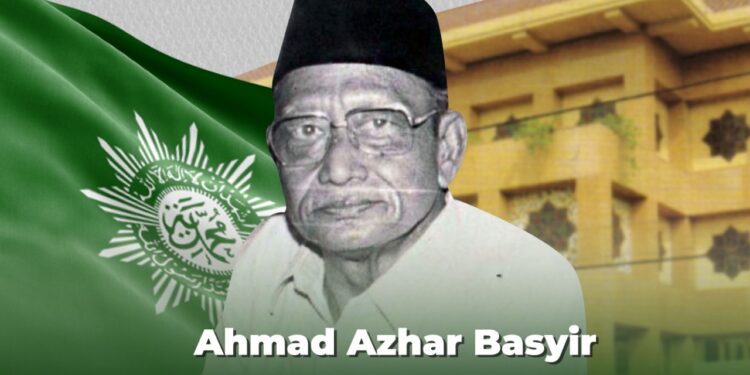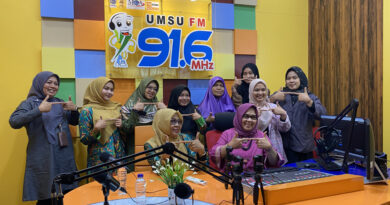The figure of Kiai Ahmad Azhar Basyir
JAKARTA – It is difficult to find the nickname ‘Kiai’ among Muhammadiyah top figures. Especially calls that come from its citizens. Compared to the nickname ‘Kiai’, Muhammadiyah members often use religious titles such as ‘Ustaz’ or ‘Buya’.
Apart from religious calling, Muhammadiyah leaders are also often called ‘Sir’, or academic titles such as ‘Professor’ or ‘Doctor’. The most respectful address to leaders is often conveyed in the form of the address ‘Father’.
This phenomenon attracts common questions. Is it true that Muhammadiyah does not have Islamic scholars and has never been led by Islamic scholars?
End of Periodization of Muhammadiyah Traditional Ulama Identity
The answer is of course not correct. Muhammadiyah has always had qualified ulama in every era. It’s just that this term has begun to recede since the leadership transition of the Muhammadiyah Central Leadership during the era of Kiai Ahmad Azhar Basyir (1990-1994).
Abdul Munir Mulkhan in the Moral Politics of Santri: Religion and Defense of the Oppressed (2003) wrote that the leadership of Muhammadiyah under Kiai Azhar Basyir marked a transitional period of ‘Ulama Leadership’ to the era of ‘Intellectual Leadership’.
Ridho Al-Hamdi in the Muhammadiyah Political Paradigm Epistemology of Reformist Thinking and Acting (2020) states that since Muhammadiyah was founded in 1912 from the time of Kiai Ahmad Dahlan to the time of Kiai Azhar Basyir, the General Chairperson of PP Muhammadiyah has always held the title of Kiai.
The need for the transition of ‘Ulama Leadership’ to the era of ‘Intellectual Leadership’ was carried out by Kiai Azhar Basyir as an organizational tajdid. Azhar’s concerns arise because the challenges of the future will not only focus on classical religious texts.
At the 1993 Tanwir Session, for example, Azhar Basyir urged the qualifications and functions of ulama for Muhammadiyah to be clarified. This demand is needed so that Muhammadiyah can move more freely in modern national life which contains many humanitarian problems and cannot be found for reference in the yellow book.
Even though he suggested Intellectual Leadership, Azhar Basyir also warned that this choice had the potential to trap Muhammadiyah in critical and elitist thinking so that it would be less accommodating to various lifestyles at the grassroots level of society.
Previously in 1985, Azhar Basyir, while serving as Chairman of the Muhammadiyah Central Leadership Tarjih Council, had expressed his concerns.
At the Muhammadiyah national seminar at the end of the 20th century before the 41st Congress in Surakarta, Azhar Basyir said that the ulama needed by Muhammadiyah were not just those who were intelligent in Islamic knowledge.
According to him, the ideal scholar is rijaluddin, namely an expert in religious knowledge as well as a preacher’s mujahid and mentor of the people. This is summarized in the Progressive Islamic Cosmopolitanism: Critical Notes of the 47th Model Muktamar Muhammadiyah in Makassar 2015 (2016).
Not surprisingly, after the Kiai Azhar Basyir Period, almost all Muhammadiyah leaders had academic degrees rather than religious titles. Abdul Munir Mulkhan in 1 Century of Muhammadiyah: Ideas for Social Religious Reform (2010) wrote that since the 43rd Congress in Banda Aceh in 1995, Muhammadiyah has been dominated by intellectuals such as Ismail Sunny, Amien Rais, Ahmad Syafi’I Ma’arif, Yahya Muhaimin, Ahmad Watik Pratiknya, Asymuni Abdurrahman and Sutrisno Muhdam.
Who is Ahmad Azhar Basyir?
Ahmad Azhar Basyir was born in Karangkajen, Yogyakarta on November 21, 1928. His father, Muhammad Basyir, was a student of the Nahdlatul Ulama figure, Kiai Hasyim Asy’ari who was specially sent to help Kiai Ahmad Dahlan’s struggle in preaching in urban areas.
“Knowing that the struggle in the city was very hard, Mbah Hasyim Asy’ari sent one of his best students to help Kiai Ahmad Dahlan’s struggle. The Santri is Basyir, who has dedicated his life to helping Kiai Ahmad Dahlan,” wrote Doni Febriando in Back to Being Human (2014).
Apart from receiving traditional Islamic education, Azhar Basyir also studied at several modern schools belonging to Muhammadiyah. Before attaining a position as an expert on Islamic philosophy and law, Azhar Basyir studied at Baghdad University, Iraq and Cairo University, Egypt.
Having joined the Battalion 36 Hezbollah Battalion and the Sabil War Force during the Dutch military aggression, Azhar Basyir’s journey to Muhammadiyah could not be separated from his father’s invitation, Muhammad Basyir when he served as Chairman of the Tarjih Assembly in 1949 so that he, who was then 19 years old, joined the Assembly. That.
“My father didn’t go to school, but he was good at reading the Koran. I learned to write Latin on my own, but my father’s Arabic writing is better than mine,” said Azhar Basyir recorded in the interview section Muhammadiyah and Journey of the Nation Volume IV by the Tempo Data and Analysis Center (2019).
Early Formation Period of 13 Muhammadiyah Central Leadership
Azhar Basyir was the first Chairman of Muhammadiyah Youth (1954). He, who had also served as Chairman of the Tarjih Council (1985-1990), became General Chair of the Muhammadiyah Central Executive for the 1990-1995 period based on the decision of the 42nd Muktamar in 1990 in Yogyakarta.
Azhar Basyir replaces Kiai AR Fachruddin who has led Muhammadiyah for 22 years. Kiai Azhar Basyir’s clerical charisma made AR Fachruddin and the Minister of Religion of the Republic of Indonesia at that time, Munawir Sjadzali, also support him. That is what Kiai Djarnawi Hadikusumo said.
The striking thing he did after becoming General Chair of PP Muhammadiyah was to carry out organizational re-functionalization and reform. In contrast to the previous period which appointed 21 leaders, during Azhar Basyir the Muhammadiyah Central Executive was downsized to only 13 people. This downsizing of the organization was carried out solely for efficiency.
“They said we were demanded by the Tajdid organization, now we are doing it,” said Azhar Basyir on the sidelines of the First Plenary Meeting at the PP Muhammadiyah Building, Menteng, Central Jakarta, who then moved to a room at the Cempaka Putih Islamic Hospital due to a power outage from Wednesday. Friday through Saturday in 1990.
“So that the 13 PP members can be thinkers for the progress of the organization and not get involved in small matters.” This was recorded in the interview with Muhammadiyah and the Nation’s Journey – Volume V by the Tempo Data and Analysis Center (2019).
Establishment of Secretariats at PP Jakarta Office and PP Yogyakarta Office
In addition to the efficiency of the management structure, Kiai Azhar Basyir also carried out re-functionalization and organizational reform. Both are carried out to clarify the duties and functions as well as adjustments to certain organizations within the Central Leadership structure.
Abdul Munir Mulkhan in 1 Century of Muhammadiyah: The Idea of Religious Social Renewal (2010) noted that there were four things that were done. Among other things, forming professional executives who are paid to manage office management, placing the position of Muhammadiyah Central Executive as an honorary position which results in not being paid a salary while leading, arranging organizational funding, and increasing compensation to the poor.
The Secretary of Muhammadiyah at that time, Watik Pratiknya emphasized that the establishment of the Executive Secretariat had the function of preparing policy materials to make decisions and work professionally.
“But they are not PP Muhammadiyah,” said Watik as recorded by the Muhammadiyah and Journey of the Nation interview – Volume V by the Tempo Data and Analysis Center (2019).
Development of Organizational Interpretation
As someone who is straight, alert and avoids political discussion, da’wah became the main theme of the Muhammadiyah movement during his leadership. This effort cannot be separated from his concern about the enthusiasm of the ulama who are enthusiastic in the fields of law and worship, but inadequate in the field of morals.
At PP Muhammadiyah’s Ramadan Recitation in 1992, Azhar Basyir revealed that the Tarjih Council also experienced the same thing. So wrote St. Nurhayati, et al via Muhammadiyah in the Perspective of History, Organization, and Value Systems (2020). Efforts to develop organizational interpretation are needed as part of tajdid.
In his own work, Reflections on Islamic Issues: Around Philosophy, Law, Politics and Economics (1991), Azhar Basyir emphasized that Tajdid requires serious efforts to change the worldview of Muslims that the world is not a prison for believers (sijnun mu’min) which makes the practice of the Koran and Sunnah inconsistent with the spirit of its teachings.
Another thing that is needed is to change the view of religion which is content with the legacy of past thinking which is limited to matters of ta’abudi (fiqh of worship) for individual satisfaction alone, while the world which is a field for charity is abandoned.
Ahmad Najib Burhani and Norshahril Saat in The New Santri: Challenges to Traditional Religious Authority in Indonesia (2020) explain Kiai Azhar Basyir’s efforts to promote organizational interpretation which is a continuation of the efforts of previous Muhammadiyah ulama such as Hamka and AR Fachruddin.
Hamka changed Muhammadiyah’s rigid and puritanical approach to promoting the values of sincerity, honesty, moderation, and resolution. AR Fachruddin combines theology, law and cultural approaches to Islam with an understanding of ikhtilaf fiqh which refers to problem solving. Meanwhile Azhar Basyir uses a deep and philosophical approach in interpreting Islam.
“Both of them are very progressive when it comes to Islamic interpretations, but are very careful in criticizing the state,” noted Najib Burhani.
Died While Leading Muhammadiyah
Kiai Azhar Basyir became the second Chairman of PP Muhammadiyah who had the shortest term and died while leading Muhammadiyah. He followed Kiai Faqih Usman who died in 1968 when he had only served eight days as General Chairperson of PP Muhammadiyah.
June 28, 1994, Kiai Azhar Basyir died at the age of 66 after being treated at Dr. Sarjito, Yogyakarta due to intestinal inflammation, diabetes, heart complications.
Buried in the Karangkajen public cemetery, Yogyakarta, Kiai Azhar Basyir is a jurist who has an international reputation.
Apart from being a permanent member of Majma’ Al-Fiqh al-Islami under the Organization of the World Islamic Conference (OIC), he received the highest award in the field of Islamic sharia Al-‘Ulum wa Al-Funnun from the Egyptian government in 1989.
Various works in the field of Islamic jurisprudence and philosophy have become reference books for academics. Amelia Fauzia in Faith and the State A History of Islamic Philanthropy in Indonesia (2013) even noted that Azhar Basyir offered progressive, rational and critical ideas about using waqf profits to empower marginalized groups and even credit loans to economically weak non-Muslim groups.
Azhar Basyir’s accommodative and moderate leadership with the transformative idea of ‘Ulama Leadership’ for the era of ‘Intellectual Leadership’ was praised by Muhammadiyah scientist, Kuntowijoyo.
In Muslims Without a Mosque (2018), Kuntowijoyo in mid-October 1994 noted that the category of ulama in the sense of ‘intellectual’ is more needed by Muslims in facing the dynamics of the times than the category of ulama with the ability to merely be ‘ulama’.
In the future (or current) industrial society, Kuntowijoyo believes that traditional types such as ‘kiai’, ‘teacher’ and ‘ulama’ will change their function to become ‘partners’ rather than owners of authority. Dichotomous scientific differences based on ‘religion’ and ‘world’ are also irrelevant so that in facing ghazwul fikri, Muslims must master these two axes. (afn)




